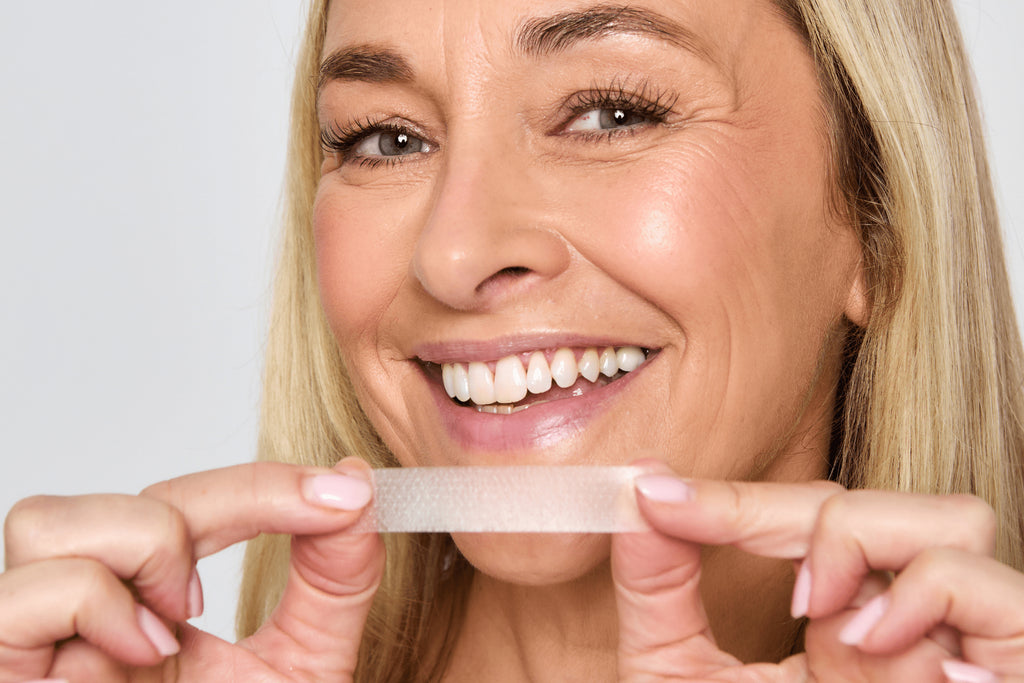Does Teeth Whitening Strips Hurt? A Complete Guide to Safety and Effectiveness

Achieving a whiter smile is a goal for many, and Tooth Whitening Strips are one of the most popular solutions available. These strips are designed to provide gradual whitening for natural teeth, helping you attain shades whiter without the need for costly dental visits. But some individuals may worry: Do teeth whitening strips hurt? This guide explores everything you need to know about whitening strips, their safety, and how to achieve long-lasting whitening results comfortably and effectively.
What Are Tooth Whitening Strips?
Tooth Whitening Strips are thin plastic strips coated with an active ingredient that removes stains from the enamel. These strips are designed to whiten teeth by lifting both surface and deep stains caused by coffee, wine, tea, and other foods. Unlike other whitening methods, such as Dentist-supplied whitening products, strips are affordable, easy to use, and available for at-home use.
Modern strips, such as those offered by Icy Bear Dental, use dental-grade PAP whitening gel instead of harsh bleaching agents like hydrogen peroxide. This innovative approach ensures safe tooth whitening, protecting enamel while still delivering professional-level results.
How Do Tooth Whitening Strips Work?
The effectiveness of Teeth Whitening Strips lies in their active ingredient, which is specifically formulated to break down stains. Here’s how they work:
- Active Ingredient Action:
Hydrogen Peroxide: Found in some traditional whitening strips, this common ingredient penetrates enamel and lifts stains but may cause tooth sensitivity.
PAP Whitening Gel: A gentler active ingredient used in Icy Bear Dental products, it targets discolouration without harming enamel.
- Gradual Whitening:
Strips work over a whitening cycle, delivering subtle whitening initially and building to noticeable results. Many users see their teeth become several shades whiter after consistent use.
- Safe Tooth Whitening:
Designed for natural teeth, modern strips protect enamel and gums, ensuring a safe and comfortable experience.
- Basic Whitening Program vs. Advanced Options:
While traditional whitening strips offer a straightforward approach, advanced whitening strips like Icy Bear utilise modern formulations that minimise sensitivity while maximising results.
Are Tooth Whitening Strips Safe?
Yes, Tooth Whitening Strips are safe for most people when used correctly. Misuse, however, can result in temporary discomfort, such as tooth sensitivity or gum irritation. Here’s what you need to know:
1. Long-Lasting Whitening Results
When used as directed, high-quality strips like Icy Bear deliver long-lasting whitening results. Their dental-grade PAP whitening gel ensures that your teeth remain bright without the risk of enamel damage.
2. Subtle Whitening with Gradual Progress
Unlike some harsh treatments, these strips offer subtle whitening during the first few uses, gradually lifting stains over time. This approach minimises sensitivity and allows users to control the whitening process.
3. Confidence in Professional-Level Results
Many modern strips, including Icy Bear Dental, are designed to deliver professional-level results at home. These results are comparable to those achieved with dental whitening products provided by a dental professional.
Common Concerns About Whitening Strips
Do Whitening Strips Cause Sensitivity?
Some users experience mild tooth sensitivity due to the active ingredient in the strips opening enamel pores to remove stains. Using products with dental-grade PAP whitening gel significantly reduces this risk.
Are Whitening Strips Effective on Stubborn Stains?
Yes, high-quality strips can tackle both surface and deep stains. For particularly stubborn stains, consider combining the strips with complementary products, such as Icy Bear LED whitening kit, for enhanced results.
Are Whitening Strips Safe for Long-Term Use?
When following the instructions, whitening strips are safe for periodic use. For maintenance, touch-ups every few months ensure a confident smile without compromising enamel health.
How to Use Whitening Strips Safely
Using effective whitening products like Icy Bear Dental Whitening Strips correctly is essential for achieving a brighter smile without discomfort. Here are some steps to maximise their benefits:
1. Choose the Right Product: Opt for strips with a proven active ingredient, such as PAP, which ensures safe tooth whitening and minimises sensitivity.
2. Clean Your Teeth: Begin with a thorough oral care routine that includes brushing and flossing. Avoid using abrasive toothpaste right before applying the strips.
3. Apply Strips Carefully: Place the strips on your teeth, ensuring the gel remains on the tooth surface and avoids contact with the gums.
4. Stick to the Recommended Time: Use the strips for the suggested duration—typically 30 minutes daily over a 14-day whitening cycle. Exceeding this time won’t yield better results and could harm enamel.
5. Maintain Your Results: Pair the strips with complementary Icy Bear products, such as our Diamond Dust Toothpaste or Whitening Mouthwash, for long-lasting whitening results.
Suggestions for Other Icy Bear Whitening Products
For the best outcomes, integrate additional Icy Bear products into your oral care routine:
Whitening Kit
Combine Tooth Whitening Strips with Icy Bear LED Whitening Kit for faster, more dramatic whitening.
Diamond Dust Toothpaste
This toothpaste supports healthy teeth by removing surface stains while protecting enamel.
Pre-Whitening Pen
Ensure even absorption of the whitening gel with this easy-to-use tool.
Whitening Mouthwash
Keep your breath fresh and your teeth bright with a stain-preventing mouthwash.
These products are designed to complement your whitening journey, delivering a brighter smile and professional-level results.
FAQs About Whitening Strips
1. Can Whitening Strips Damage Enamel?
No, whitening strips are safe for enamel when used as directed. High-quality products, such as Icy Bear Dental Whitening Strips, use dental-grade PAP whitening gel to lift stains without eroding the enamel. However, overuse or exceeding the recommended time can weaken enamel, leading to tooth sensitivity or increased risk of decay. Always follow the usage instructions provided with the product to maintain strong, healthy teeth. If you are unsure, consulting a dental professional can provide additional guidance.
2. Are Whitening Strips Painful?
For most users, whitening strips are not painful, although some may experience mild tooth sensitivity during or after use. This sensitivity occurs because the active ingredient in the strips temporarily opens the pores in the enamel to remove stains. Products like Icy Bear Dental Whitening Strips are designed with gentler formulations to minimise this risk. If discomfort occurs, reducing the frequency of use or switching to Effective Non-sensitive Teeth Whitening Strips can help alleviate the issue. In severe cases, consult a dentist for personalised recommendations.
3. Can I Use Whitening Strips with Sensitive Teeth?
Yes, individuals with sensitive teeth can still benefit from whitening strips by choosing formulations designed for sensitivity. Strips containing dental-grade PAP whitening gel, like those from Icy Bear Dental, are an excellent choice for a gentle yet effective whitening experience. Avoid traditional whitening strips with high-peroxide concentrations, as they may exacerbate sensitivity. Pairing your whitening routine with an enamel-strengthening toothpaste or fluoride rinse can also enhance comfort and effectiveness. Regular dental check-ups can help ensure that your whitening approach aligns with your overall Oral Health goals.
4. Do Whitening Strips Work on Deep Stains?
Yes, whitening strips are effective at removing both surface stains and stubborn stains that penetrate deeper into the enamel. Their advanced formula works to break down discolouration caused by foods, beverages, and smoking over a consistent whitening cycle. For tougher stains, combining strips with complementary whitening products, such as an LED whitening kit, can deliver more noticeable results. Gradual and consistent use of strips ensures that the whitening process remains safe and controlled, avoiding any risks to enamel or gums. For deeper discolouration, consulting a dental professional may also be beneficial.
5. Are Whitening Strips Safe for Gum Disease?
If you have gum disease or other oral health issues, it’s best to consult a dentist before using whitening strips. While strips are generally safe, applying them over inflamed or damaged gums could exacerbate discomfort or irritation. A dentist can help determine whether it’s safe for you to proceed with a basic whitening program or if you require a more complex tooth whitening process tailored to your oral health condition. Always prioritise resolving any active gum issues before starting a whitening routine to ensure the safety and health of your teeth and gums.
6. How Long Do Whitening Results Last?
The results from whitening strips can last anywhere from a few months to a year, depending on your lifestyle and oral care routine. To extend the longevity of your white smile, limit the consumption of staining foods and drinks like coffee, tea, and red wine. Regular use of maintenance products, such as Icy Bear Diamond Dust Toothpaste or Whitening Mouthwash, can help preserve your whiter teeth over time. Incorporating touch-ups with strips every few months is also a great way to keep your smile bright. For optimal results, align your whitening routine with professional advice from a dentist.





